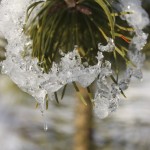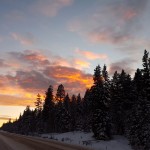Originally published as a column in News Kamloops on Friday November 27, 2015.
 Last weekend found us and the boys at Lac Le Jeune delighting in thick snow and sparkling hoarfrost. It could not have been more beautiful. A magical glimpse into winter wonderland, quiet and mysterious at times, and then sprinkled with noises of birds and boys and lake ice vibrating in long organ-like sounds as the boys were throwing handfuls of icy snow on the newly formed solid layer.
Last weekend found us and the boys at Lac Le Jeune delighting in thick snow and sparkling hoarfrost. It could not have been more beautiful. A magical glimpse into winter wonderland, quiet and mysterious at times, and then sprinkled with noises of birds and boys and lake ice vibrating in long organ-like sounds as the boys were throwing handfuls of icy snow on the newly formed solid layer.
To see that world, animal tracks included, just a few steps away from the busy city life, is to be reminded of why I keep going back to the same plea I’ve been at for years now: let’s save the world. It’s so worth it.
Holidays approach and that means joy, but so much of what we identify with winter joy has been commercialized and comes with an expiration date. So much of what children associate with winter joy nowadays has to do with the short-lived exhilaration of packages, and so much of their interaction with nature itself has been reduced over the years.
We can all do more with the nonmaterialistic joy that comes from connecting with nature and understanding its mysteries rather than attempting to conquer it in any way.
Yes, the planet can only hold so much garbage and only so much ‘reusable’ debris can be disassembled (by people who have no other choice in countries we don’t think of often enough) before the excess starts showing in inelegant ways.
The word is out about plastic being all over our big blue oceans. Again. An estimated 8 to 12 tonnes of plastic is dumped in the ocean annually by coastal countries and if more is produced, more will find its way into the water.
As for biodegradable plastic, let’s just say it’s not what it sounds like. Science has recently spoken out about that too. There is no miracle biodegradable plastic that disintegrates after we dispose of it unless certain conditions are met, so companies need to rethink their products and customers like us have to reuse what we have and avoid buying more plastic.
We’re far enough inland to not find the odd plastic bits during a stroll on the shore, but the Thompson Rivers are suffering from the same disease, albeit at a smaller scale. It’s not hard to spot the unsightly bits when you’re out and about.
Yes the planet is a small place to be after all. Our growing population needs some new rules of engagement and because we have more choices than so many people in the world who are already feeling the effects of climate change, we have to give it a good go.
I’ve been told and I’ve read countless times that one person cannot make a difference; not when it comes to climate change in the era of greedy corporations. Why do we keep saying that? Who’s to benefit from it? Not us, not in the least. Overconsumption of goods has the individual as the problem but also as the solution. Worth a try.
On the eve of COP21 and amidst so much world turmoil (much of it tied to economic reasons), choosing to focus our gaze on the sea of plastic that’s engulfing us, both at sea and on land, and looking close enough to our world suffering from human activity wounds, whatever their nature, we have to consider making better choices by buying less or recycled, eating less meat and driving less. A matter of much needed civic responsibility rather than a pre-Christmas Grinch-like attitude.
Seeing the wealth of offers for Black Friday and beyond makes me ask a question that is as uncomfortable as it is obligatory: is it right to give our children the illusion that the world is well and bountiful and the Christmas cheer is to be welcomed without a worry in the world? Or is that akin to pulling the rug from under their feet as they make their way into tomorrow?
A recent scientific report documenting the glaciers in Tibet warns of fast melting, which could leave almost a quarter billion people with less water for daily consumption, agriculture and household or commercial purposes. Glaciers in Bolivia, Pakistan, Austria, Canada and the US are not far behind.
Earlier this year, over 300 sei whales ended up stranded in a fjord in southern Chile in what National Geographic called the world’s largest stranding ever. The causes are yet to be found. It could be the ocean water that is getting too warm and acidic and thus causing an algal bloom toxic to marine mammals, or a high concentration of pesticides due to agricultural run-off, or floating garbage.
If we think of animals as our canaries, we should approach their occasional unexplained sudden demise with interest, for our well-being and theirs are tightly interwoven.
This is not scaremongering but facts derived from scientific reports. They point to things happening and that means we have to change our course of action. Hence the climate meeting about to take place in Paris.
Various actions are possible at various levels. We can pressure our newly elected government to reassess some of the hasty environmentally-unsound decisions made by the previous government, we can keep informed about new exploitation projects that may jeopardize our land or waters (like the drilling to be done by Shell off the coast of Nova Scotia) and make enough noise to hopefully prevent environmental disasters, and we can choose to leave enough manufactured goods on the shelves to reduce demand and thus reduce pollution. There’s more of course.
We are fortunate to live in a world that comes with so many perks for so many of us. It is nothing but honouring to remind ourselves that we can also sign up for the duty of doing all that we can to save the world that has given us so much, from the enrapturing beauty of a sunset over snowy mountains to the miracle of seeing life appear, whether it is a leaf bud, a butterfly or the birth of a baby.
By not keeping silent about unpopular topics (like this one) and by acting in ways to show it, we can achieve something. No action is small enough to not count.
In solidarity with the rest of the people being loud and visible on November 29, please consider visiting Riverside Park at 1pm to participate in the Climate Change Rally. The world will thank you for it.





















